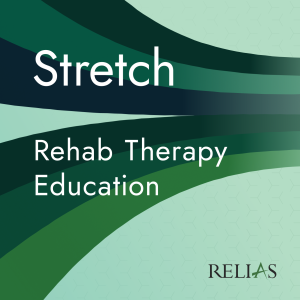
OT, OTA – this podcast may help you meet your continuing education requirements. Access Relias Academy to review course certificate information.
As occupational therapy professionals, you already have the skill and training to treat chronic pain. In this episode, we talk with Kimberly Breeden, MS, OTR/L, and Niccole Rowe, BA, COTA/L, co-authors of the AOTA official document “Occupational Therapy’s Role in Treating Pain” about the role and value of OTs/OTAs in managing chronic pain.
How are we doing? Click here to give us feedback
(02:06) Key Takeaways
(03:04) Changing Perspective Can Change Your Practice
(07:18) Change from Biomedical to Biopsychosocial Approach
(11:22) Pain’s Purpose and Factors that Impact Persistence
(17:08) Addressing Pain Through an OT Lens
(21:55) Developing an Occupational Profile
(27:32) Pain Assessment Tools
(30:12) Addressing Psychosocial Factors
(33:09) Cognitive Behavioral Therapy
(38:48) Additional Treatments Using Occupation
(46:49) Pain Education, Relaxation, and Mindfulness
(52:00) The Interdisciplinary Team: Building Your Network
(54:10) Case Example
(1:02:08) Conclusion
The content for this course was created by Niccole Rowe, BA, COTA/L.
The content for this course was created by Kimberly Breeden, MS, OTR/L.
The content for this course was created by Wendy Phillips, PT, BSPT.
Here is how Relias can help you earn continuing education credits:
Access your Relias Library offered by your employer to see course certificate information and exam;
or
Access the continuing education library for clinicians at Relias Academy. Review the course certificate information, and if eligible, you can purchase the course to access the course exam and receive your certificate.
Learn more about Relias at www.relias.com.
Legal Disclaimer: The content of Stretch: Relias Rehab Therapy Education is provided only for educational and training purposes for healthcare professionals. The educational material provided in this podcast should not be used as medical advice to treat any medical condition in either yourself or others.
Resources
Pain Disability Index (PDI):
http://www.med.umich.edu/1info/FHP/practiceguides/pain/detpdi.pdf
Pain Management Best Practices Inter-Agency Task Force Report: https://www.hhs.gov/opioids/prevention/pain-management-options/index.html
Pain Self Efficacy Questionnaire (PSEQ):
Pain Toolkit:
https://www.paintoolkit.org/pain-tools
PEG Scale Assessing Pain Intensity and Interference (Pain, Enjoyment, General Activity):
http://www.med.umich.edu/1info/FHP/practiceguides/pain/PEG.Scale.12.2016.pdf
No comments yet. Be the first to say something!